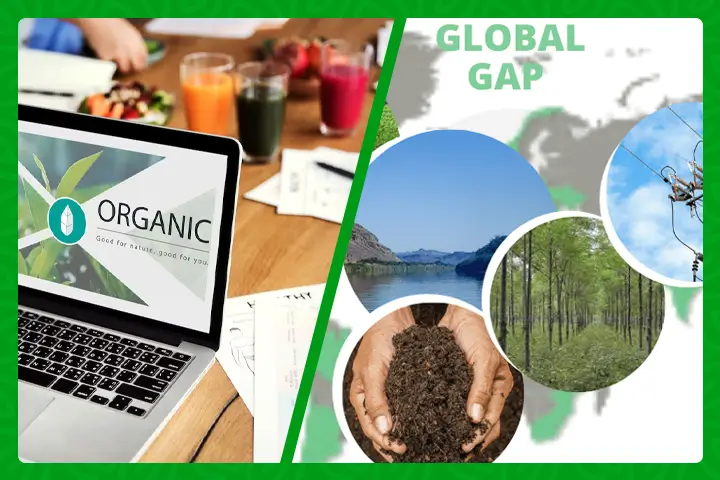
Africa, with its vast and diverse landscapes, has the potential to become an organic agricultural powerhouse. However, a significant gap exists when it comes to the formulation or lack of organic policy in respective Countries. Additionally, there is a growing misunderstanding where the Global Good Agricultural Practices (GAP) certification is sometimes mistaken for organic certification. This article explores these two critical issues and their implications for the African organic farming sector.

Africa’s Missing Organic Policy
While many African nations have made strides in organic farming methodology, the reality is there is no organic policy framework to guide and regulate this sector. Organic agriculture is characterized by sustainable practices, the absence of synthetic chemicals, and strict adherence to organic principles. Without a policy, African countries often follow or float with different standards, Agriculture departments, and competent so-called Organic Advocates are not knowledgeable of Organic Codex, what are their procedure (Inspections, Review, Validation, Auditor competency, Record keeping, Training, etc.) in certifying a Product, Farm, or a Unit Organic making the integrity and consistency in organic production a true challenge.
Challenges of the Policy Gap
1. Lack of Organic Standards: The lack of organic policy leads to varying standards and definitions of organic farming practices across the continent. This inconsistency hampers trade and market access for African organic products.
2. Consumer Confidence: Inconsistent standards erode consumer confidence in organic products from Africa. Without a clear and recognized policy framework, consumers may doubt the authenticity of organic labels, but it’s also the consumer who is confused about what or how it should be considered Organic.
3. Poor Organic imaging: The absence of an Organic policy makes it challenging for African countries to image the prestige value of domestic Farm production or processed material to the international markets. For example, India has its own Organic Standards or Policy called NPOP (National Program for Organic Production) and each Third-party Certification in India has to mandatorily make sure the Operator or farmer or FBO gets certified by NPOP duly also licensed to the FSSAI (Food Safety Standard Authority of India) before any other International based Organic standards.

Global GAP vs. Organic Certification One common misconception in Africa is the conflation of Global GAP certification with organic certification. Global GAP, while valuable in promoting safe and sustainable agricultural practices, is not equivalent to organic certification. Global GAP focuses on general agricultural practices, including food safety and environmental sustainability, but it
does not require the complete absence of synthetic chemicals that is a hallmark of organic farming.
The Implications
1. Misleading Consumers: When Global GAP is mistaken for organic certification, it can mislead consumers who expect products to be entirely free from synthetic chemicals.
2. Market Confusion: African organic producers may face challenges in international markets when products with Global GAP certification are presented as organic, potentially leading to trade disputes.
3. Missed Opportunities: The misunderstanding can lead to missed opportunities for African organic producers who may not pursue true organic certification, thinking Global GAP is sufficient.
Global GAP and Organic Certification are DIFFERENT

The Way Forward
To address these challenges, African countries should consider the following steps:
1. Develop an Independent Organic Policy: Respective Countries should work to establish a Unique Independent organic policy/Standards/Regulations or Guideline framework that harmonizes organic standards as per the Geographic practices of the country.
2. Promote Organic Education: Raise awareness about organic principles and certification processes to reduce the confusion between Global GAP and organic certification with the help of competent trained Agriculture Extension Officers or NGOs. 3. Creation of Independent Domestic Certification Bodies: Invest in evolving domestic organic certification bodies and accreditation programs to ensure that they have the capacity to certify products according to international organic standards. Once established the next stage is achieving International Organic accreditation with the assistance of Organic Regulatory Certification Consultancy like Organil Services. For example, if an Organic Material needs to move to USA it has to be Certified again by NOP (USDA) accredited Third Party Certification body.

Africa’s respective countries’ potential in organic agriculture is immense, but it faces the Critical challenge of a missing organic policy framework and the misunderstanding of Global GAP as organic certification. Addressing these issues is crucial for fostering a new segmentation thriving organic sector in Africa, ensuring consumer trust, and enabling African organic producers to compete effectively in the global market. A concerted effort to develop, Support, and implement organic policies can unlock the continent’s organic farming potential and contribute to sustainable agricultural practices.
(Anil M V, Founder, Organil Services)
Organil Services are Registered for Organic Regulatory Certification Consultancy and Accreditation Services in the Industry. WhatsApp for a Prepaid Consultancy +91 8606551335
Stay updated with the latest farming tips and agriculture industry news from Africa by subscribing to our newsletter. Don’t miss out on valuable insights and updates. Follow us on Twitter, LinkedIn, and Facebook to join our farming community and stay connected with us.



















